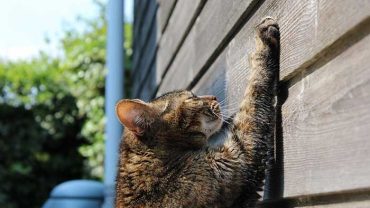A cat scratching the wall is indeed one of the cutest displays of grace and energy your feline friend will ever put up.
Most pet owners believe that a cat scratching on the wall is an indication that the feline is full of energy and is looking for an appropriate channel to release some of it. While there’s some truth to that, it isn’t the main reason behind the habit.
Most cats scratch the wall to rid their claws of the dead outer sheath. It’s an intrinsic behavior that enables the cat to keep its claws healthy and functional.
As the kitty scratches the wall, the points on its outside husk wear down. In turn, newer and sharper nails grow from those points, adding an extra layer of protection and beauty to your cute little friend.
Table of Contents
Is It Only the Walls That Cats Love to Scratch?
Many cat owners are usually found asking themselves, “why do cats scratch the wall”? Indeed, it’s true that most feline scratching behavior happens on the walls. However, as a pet owner, you should also look for other areas and objects your cat scratches.
In fact, you should be more concerned about your cat scratching certain other objects, and not just the wall. That way, you can establish much faster whether the behavior is destructive or a regular part of a kitty lifestyle.
The following are some other objects your cat may scratch;
- Furniture; be they outdoor or indoor,
- Floor,
- Reflective surfaces such as the glass door or mirror,
- Carpet,
- Couch,
- Trees, and
- Outdoor posts.
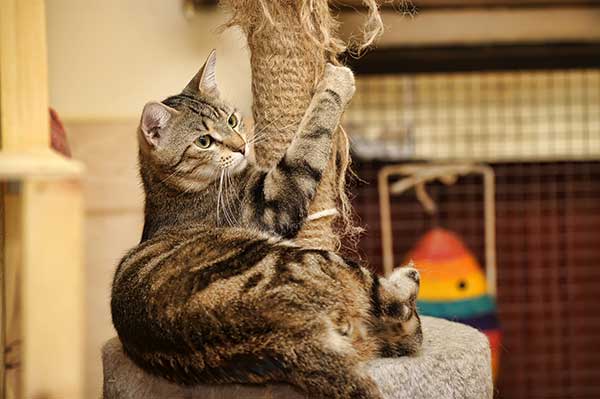
A cat scratching on a brick wall may not come with as many concerns as when the cat scratches on your carpet, furniture, and upholstery. The behavior usually begins as a subtle display of feline gracefulness. Before you know it, you’re having to replace your furniture, carpet, and upholstery. And that comes with a heavy financial burden.
Besides the possible financial implications of a cat scratching on certain surfaces, there are also medical concerns on the part of the cat that you should worry about. Is the cat displaying some sort of hyperactivity? Is it responding to an allergic reaction? These are some of the questions you’ll need to settle as the cat’s owner.
And to do that, you’ll have to define the often fine line between normal kitty scratching and potentially destructive scratching.
Let’s highlight some of the reasons that would make your feline friend take to scratching the wall and other surfaces.
Top Reasons Why Cats Scratch On Walls
1. Removal of Dead Outer Skin From Their Claws
As we already pointed out, the main reason why your cat would scratch on the wall is to rid its claws of the dead outer sheath. It’s an intrinsic behavior that enables the cat to keep their claws healthy and functional.
Remember that apart from its teeth, a cat’s claws form a fundamental component of the feline’s arsenal. They are what the cat uses to pounce on their prey and hold them down, fight off interlopers, and basically hold onto any object. But with time, claws develop sheath. And when that happens, it interferes with the feline’s ability to grasp onto objects or put up a good fight.
Scratching on hard surfaces, such as a brick wall, helps to wear down the points on the outside husk. And as a result, newer and sharper nails grow from the worn-out parts. Think of it like sharpening a machete to get rid of a layer of rust.
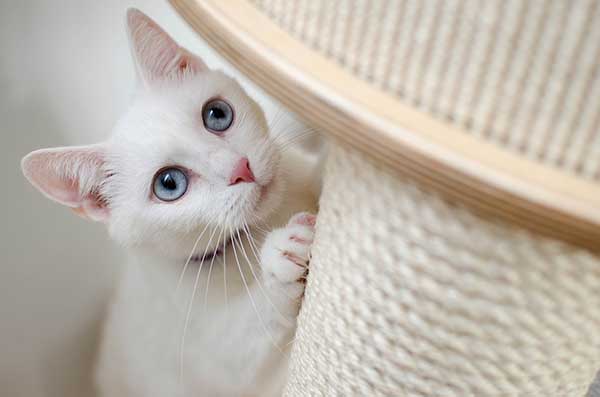
2. Wall Scratching May Symbolize Inter-cat Conflicts
Another possible reason your cat may be scratching on the wall is due to inter-cat conflicts. As you may expect, this happens when there is more than one cat in a home or within the neighborhood.
Cats are creatures of conflict, and they hardly tolerate one another. Unlike dogs, cats are solitary animals. That is a trait they have carried from some of their wild relatives, such as the leopard, cougar, jaguar, and tiger. Therefore, they’re bound to feel uneasy sharing a home or patch with a few more cats. In fact, in a cat’s world, another cat is simply one too many.
According to certain studies, a cat is likely to scratch on a wall due to the pheromones left behind from previous scratching. In essence, if a cat scratched on a surface, there are only higher chances that another cat will scratch on the same surface.
When multiple cats leave their pheromones on the same surface, conflicts are bound to ensue. Therefore, experts advise giving each cat an object of their own to scratch, as the surest means of averting any possible feline confrontations. Above all, the objects must be located within a reasonable distance from each other.
3. Marking of Territory
Cats are highly territorial. Again, this is a behavior that felines have inherited from their distant wild relatives.
Territorial disputes account for a considerable number of feline fatalities, both at home and in the wild. So, when you see your cat scratching on the wall, the chances are that it might be trying to mark its territory.
Unlike the case with inter-cat conflicts, cats scratch to mark their territories even when there is no apparent threat. It’s rather a declaration that “this patch is mine and should any cat stray, it must either be ready to play by my rules or be expelled dishonorably.”
Cats have sweat glands located between their paw pads. And as they scratch on the wall, they leave their scents on the clawed objects. That way, any cat that wanders into this territory will immediately tell that the patch is taken.
However, you must remember that cats do not only mark their territories to warn intruders of possible consequences. In a cat’s world, everything within the cat’s domain belongs to it. That includes other pets, its owner, other human members of the family, and any object within the homestead. So, scratching on a surface may symbolize that the cat is asserting its possession of the said clawed object.
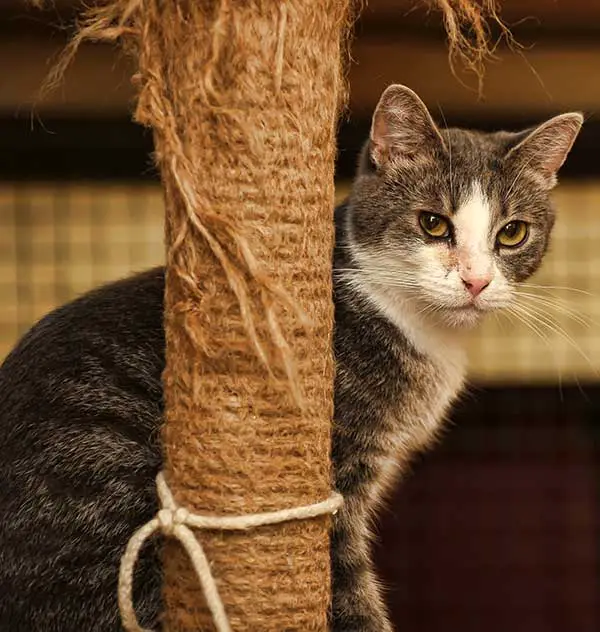
You must also remember that cats don’t mark their territories every day. The phenomenon happens only once in a while. It’s most common if you moved homes or changed environments.
As soon as the cat gets to its new home, it will begin to scratch on surfaces in a bid to leave its scent on them. You may also realize that the behavior is more profound when you change your furniture or do a minor home renovation.
When the cat can no longer detect its previous scent on the wall and other objects, it will immediately begin to scratch the new objects.
Most importantly, cats don’t scratch on walls as a sheer show of bravado. By leaving their scent marks, they’re simply trying to avoid confrontations with potential rivals by warning them that the patch is taken. For the most part, cats try to avoid confrontational situations. And a feline that picks up the scent of another cat will likely keep off as opposed to going for an all-out war.
4. An Expression of Happiness Or Boredom
Cats may scratch on surfaces to show they’re happy with their surroundings. It’s the human version of hand clapping. When a cat is contented with its environment, it will take to all sorts of playful behavior. And scratching is one of them.
Happiness-instigated scratching mostly happens when a cat is full, and rightfully so. A well-fed cat has a lot of energy to let out. And if rolling in the grass, pawing in the air, or playing its favorite game won’t allow it to release all the energy built within it, the cat may take to wall scratching.
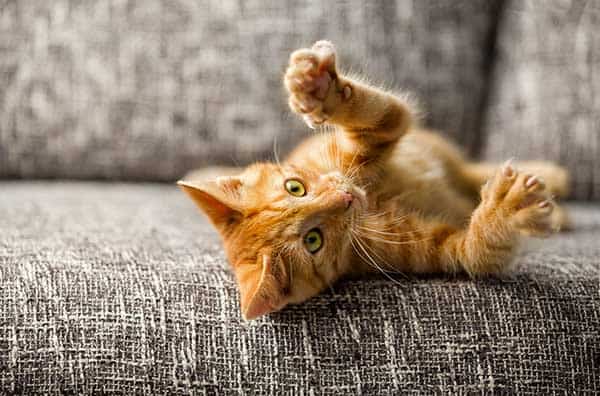
It’s easy to tell that a cat is scratching due to happiness, as the behavior almost always happens when the feline is full and playing by their favorite humans.
Some cats might scratch on the wall due to boredom. This typically happens with spoilt cats.
When you get your cat enough toys, it’s your hope that the feline will make good use of its toys and stop scratching on other surfaces. So, it may appear unusual that a cat will abandon its toys and go scratching on other objects.
However, cats can be very mischievous at times. That even after offering them all manner of cat toys, they will still find it fanciful to play with your furniture, carpet, and walls. Perhaps it shows the cat is fed up with its current playthings and need a new set.
Boredom may also happen when you’re away and the cat is alone. Cats find scratching on the wall to be quite distracting.
5. The Stress Factor
Like humans, cats also suffer various kinds of emotionally- and mentally-stressful situations. The most common causes of feline stress include separation anxiety, traumatic experiences, and minor changes in their environment.
Generally, anything that disrupts the cat’s daily routine is likely to make them anxious and stressed. And scratching on surfaces is one of the ways through which feline anxiety manifests.
When you’ve been gone for too long, your cat will invariably develop separation anxiety. Scratching is one of the common signs of separation anxiety. It happens when the cat misses you so much that it scratches on surfaces as a consolation that everything is still under control.
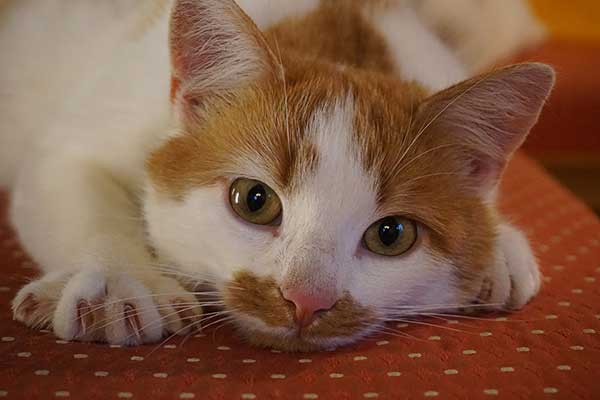
Anxiety-related scratching should always be taken seriously, as it could develop into full-blown mental conditions. That’s why it’s paramount to always pet your cat whenever you’re back after a long absence. It reassures the feline of your love and concern, and may make it abandon its destructive scratching habit.
When cats scratch walls due to anxiety, you’ll realize they’re also meowing. So, that helps settle the question, “why does my cat meow and scratch the wall”?
At times, you may not even have been gone for too long. A subtle change in your routine, such as a party, minor home refurbishment, or even a new cologne, is enough to throw your cat off balance and have it scratching everything.
6. Scratching After Using the Litter Box?
You may be wondering to yourself, why does my cat scratch the wall after using the litter box?
Unusual as it may sound, most cats will immediately begin to scratch the wall and other objects after using the litter box.
In most cases, the behavior is due to the size of the litter box or the litter itself. If the litter box is too small, the cat will scratch. Similarly, the feline will scratch if it finds the litter quantity too little or too much. It’s a show of displeasure with its litter.
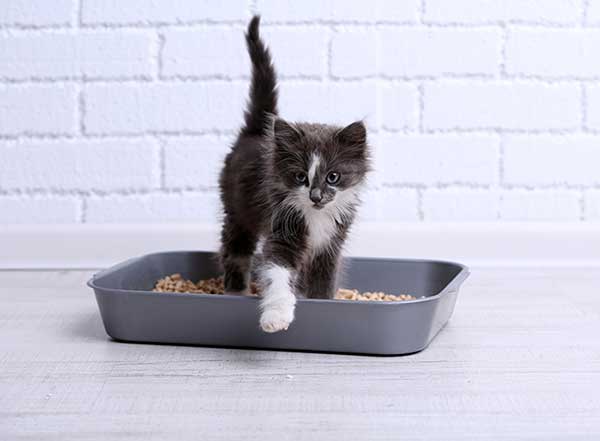
7. Scratching After Eating
But why does my cat scratch the wall after eating?
Ever watched how a leopard hauls its meal to the highest tree branch after eating to its fill? The same phenomenon happens in cats, albeit in a different fashion.
A cat may scratch on the wall in a bid to hide its food for a later time, especially after it has had its fill. It’s a trait that cats inherited from their wild ancestors who would bury their food to eat at a later time when prey is scarce.
Another theory behind a cat scratching the wall immediately after eating is that the feline may not like the smell of the food. Therefore, it might be trying to hide the distasteful smell by burying it in the wall. If it’s the food the cat finds repulsive, you won’t possibly see this behavior when you serve it a different food.
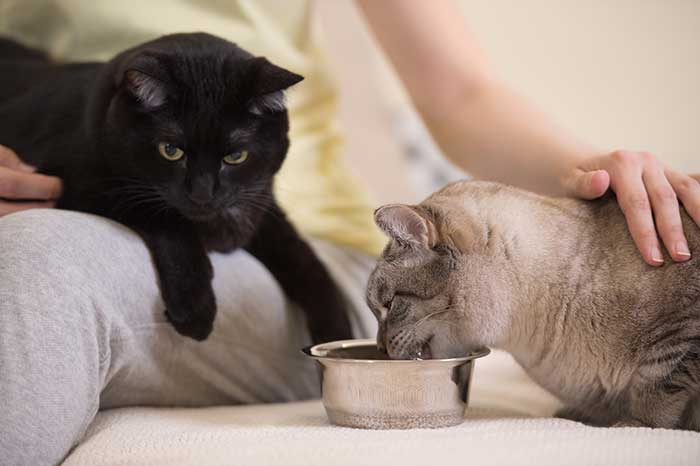
8. Scratching After Pooping
But what of pooping? Why does my cat scratch the wall after pooping?
Besides trying to hide their food for a later time, you may also have realized that your cat scratches the wall or other objects right after pooping.
Indeed, one of the questions vets typically get from many pet owners is – my cat scratches the wall after popping, so what should I do?
Cats have a natural tendency to bury their excrements. That’s why you’ll normally see them scratching on the floor or the grass to try and find a perfect spot for their stools. This is a behavior cats deploy when they don’t want other cats to pick up their scents from their stools.
Also, remember that cats are naturally clean pets. They detest the smell of their poops and whenever they pick up dirt, dust, or smelly substances, you’ll often see them licking profusely on the spot to get rid of the unsightly mark or bad odor.
The same applies to burying their poop. It usually happens when the cat finds its litter too small. As a result, the cat goes looking for another place to bury its poop and avoid creating a mess.
In most cases, a cat scratching to bury its poop will go for the hidden spots, such as in your backyard. But since it’s inside the house and can’t possibly get out, the cat will scratch on the wall or floor looking for a perfect spot to hide the mess.
9. Mice on the Wall?
At one time, you may have asked yourself, why does my cat scratch the wall at night? One of the possible reasons is the presence of mice in your wall.
Cats have an acute sense of hearing. In most cases, they’ll pick up a mice moving in the wall even without seeing it. As a result, they respond by scratching near the spots where they picked up the sounds.
Mice in your walls is a precursor for disaster. It could attract venomous serpents and other reptiles into your house. Therefore, you must get rid of it as soon as you can. You can spread some flour on the floor as you go to sleep. The mice will come out to nibble on the flour and possibly, the cat will capture it.
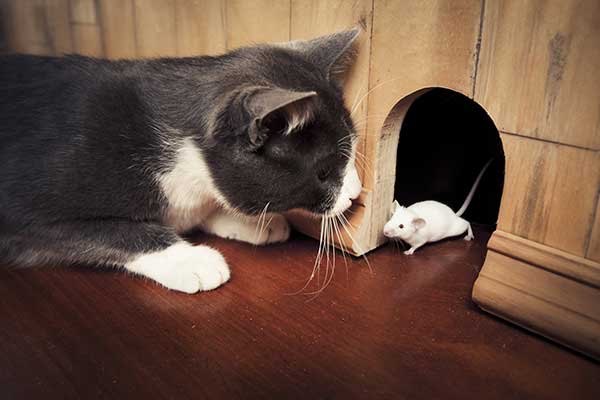
10. The Mirror Effect
If your wall is made up of glass or other reflective surfaces, then you’ll have to contend with some scratching from your cat. It’s a natural part of their inquisitiveness.
When a cat sees its image on a reflective surface, it will try to find out who that other guy is. Due to their territorial nature, the cat may begin sizing up its “opponent” and finally start scratching them.
And since their reflection also responds in a similar manner, the scratching may continue even more profusely. It may take some time before the cat finally realizes there’s no one on the other end but its own reflection.
The mirror test has often been used to test the intelligence of cats. Cats that pass the mirror test are able to make out their own image, and won’t get aggressive seeing their reflections on a mirror.
How Do I Get My Cat To Stop Scratching The Walls?
After learning about the many reasons why cats scratch the wall, your next question is possibly, how do I stop a cat from scratching walls?
Right off the bat, let’s emphasize that the remedy you adapt to prevent your feline friend from scratching objects must address the root cause of the problem. Therefore, you should first establish what causes your little furry friend to scratch on walls and other objects.
The following are some tips you can employ to redirect destructive scratching habits.
1. Trim Your Cat’s Nails
Trimming your cat’s nails regularly can significantly help reduce the desire to scratch on walls. If a cat feels as though its nails are sharp and overgrown, it will naturally want to claw on surfaces. It’s the same phenomenon as head-butting and horn-locking among cattle and most herbivores.
However, trimming your cat’s nails isn’t a walk in the park. That’s because the nails are very sensitive and a little paw may leave your hand with serious incisions.
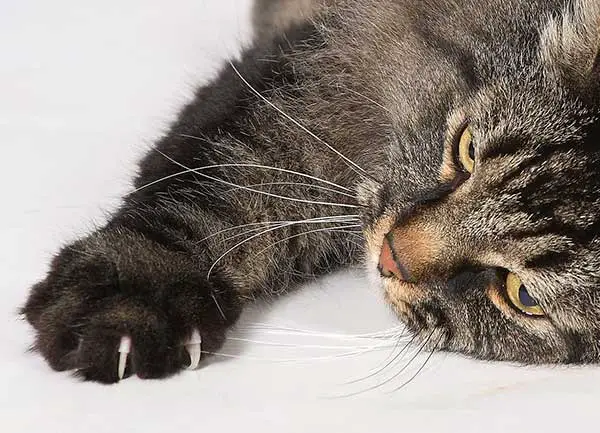
First, you must earn the feline’s trust so that the cat can comfortably lie still as you conduct the exercise. Also, choose a time when the cat is most relaxed, and do the nail-trimming gently using clippers that are specifically designed for cat claws.
If you’re dealing with skittish cats, you may consider towel-wrapping them to restrain them and avoid undue pawing.
2. Get Your Cat a Scratching Post
Let’s face it; while you can somewhat stop your cat from scratching on objects, it’s difficult to get rid of the habit permanently. You never know what your furball gets up to while you’re away.
Therefore, a practical approach would be to get the cat a scratching post instead. But this calls for careful analysis of the kind of surface the cat scratches.
Cats will not just scratch any object; they’re quite selective on the kind of surfaces they go for. Perhaps, the cat finds the location of the object convenient. For instance, an object located within a cat’s playground will inevitably be a victim of scratching.
So even as you remove these objects and replace them with scratching posts, ensure you place the posts on the same spot where the previous object was.
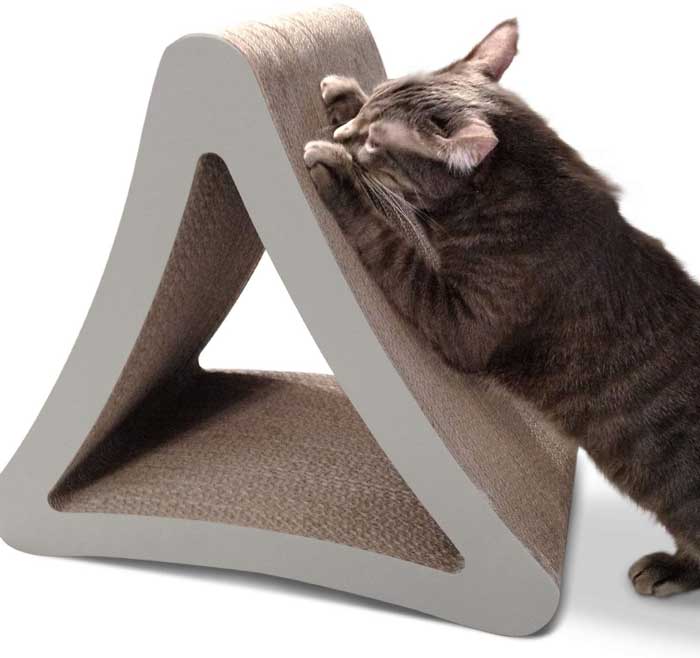
A cat may also prefer scratching on other surfaces due to the texture, height, shape, and smell of these objects.
Generally, try to observe all the physical features of the favored object. Then, try to replace it with a very similar but alternative scratching post. If you have more cats at home, have as many scratching posts and place them reasonably apart. That will help avert confrontations.
At times, it may be difficult to replace the favored object with a new scratching post. There’s no need to fret, as there’s a wide range of options you can apply here.
Some of these include;
A. Covering the inappropriate object with something that cats generally find unappealing. Examples include double-sided sticky tape, sheets of sandpaper, or aluminum foil.
B. Covering the favored object with an aversive odor, such as a perfume or a muscle rub. However, the odors you choose must only be ones that the cat finds repulsive, not ones that could cause allergic reactions.
C. Move the inappropriate object gradually to a suitable location. Perhaps, you may consider moving it 3 to 5 inches every day till you get it to the desired spot.
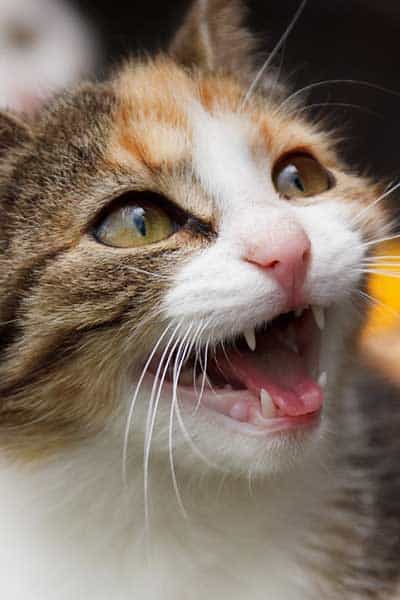
3. Supply the Cat’s Needs
Another way you can prevent your furball from scratching on the wall and other surfaces is by supplying all its needs.
We mentioned earlier that a cat might scratch on the wall if it’s trying to hide its poop due to a small litter box. How about you increase the size of the litter box.
Besides, ensure you empty the box as regularly as possible. That way, the cat will always find its litter box clean whenever it needs to use it, and will not be tempted to poop outside the box.
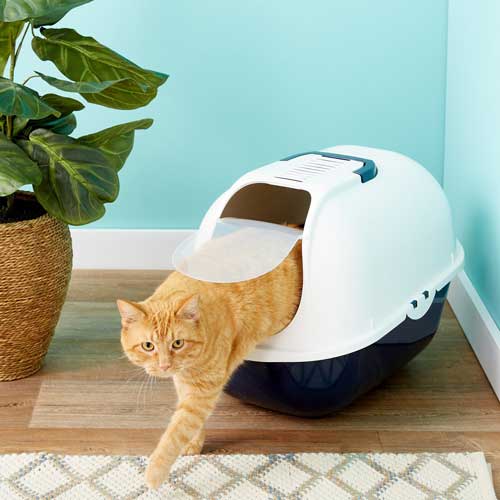
Better yet, simply supply your cat with all its basic needs, such as food, water, shelter, and ample petting time. Cats have a way of drawing the attention of their owners to something that they feel is out of place.
Be keen to establish what the cat is anxious about and fix the situation right away. Is it the smell of your cologne? Is it the rough texture of its beddings? Or perhaps it’s certain unsettling sounds. All these may make the cat anxious and begin to scratch as a means of seeking your attention.
As a general rule, strive to make your cat’s life as satisfactory as possible, both from the physical, nutritional, and emotional points of view.
4. Pheromone therapy
As cats can often scratch surfaces in response to the pheromones left behind by other cats, you can deploy a pheromone therapy to reduce stressful and undesirable scratching behavior.
In a pheromone therapy, you use synthetic variants of the cat’s natural pheromones to make your cat feel more secure during stressful situations. Examples of synthetic feline facial pheromones include Comfort and Feliway.
You only have to sprinkle some amount of loose catnip on the surfaces the cat scratches, so as to lure the cat to those surfaces. Once the cat gets there and picks up “its scents,” it won’t bother scratching the posts any further.
? You can also collect your cat’s natural pheromones by gently rubbing their cheeks using a soft piece of clothing. Then, you rub the collected smell on surfaces around the cat’s patch. As soon as the cat picks familiar scents, it will have no reason to scent-mark the surfaces again, and scratching will be significantly reduced.
5. Indirect Punishment
When the situation calls for it, you can mete out some punishment, albeit a subtle and indirect one. For instance, you can watch as the cat approaches the inappropriate object and just before it begins to scratch on it, use a whistle to distract it.
Cats generally find short, sharp sounds unsettling. Therefore, they may learn to associate the sounds with wall scratching and eventually stop the behavior.

Other distractions you can apply include shaking a soda can that’s filled with pebbles, using a water-filled squirt bottle, or installing a motion detector near the object to sound an alarm whenever the cat approaches it.
6. Explore the Outdoors
Sometimes, a cat scratching walls and meowing could be indicative of too much restraint. Perhaps the cat finds its play space too tight and unmatched for its energy. In such cases, you may consider exploring alternative methods to help the cat get rid of excess energy.
For instance, you can take the cat for a walk or go play in the backyard. If your cat is among the cat breeds that love water, you may even go for a dip together. Always remember that nothing matches outdoor activities in terms of letting pets release their excess energy.
Conclusion
Evidently, there are numerous reasons why cats scratch walls or various surfaces.
The habit is more intrinsic, which makes it reasonably difficult to eradicate. Fortunately, you can significantly help redirect the behavior by following a host of the remedies suggested in this post.
But what if my cat won’t stop scratching walls?
If your cat just can’t break this inappropriate habit, you may consider seeking the opinion of a professional vet. There might be an underlying medical condition making your cat to scratch more persistently and regularly than it should.
Never punish the cat unless you find it scratching objects when you’ve clearly offered alternatives. But even then, ensure the punishment is meted out in a loving and caring manner. The goal is to help the furball break the habit, not scare it away.

